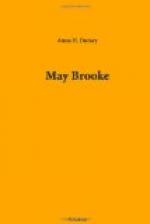“I will come again in a few hours, and administer to you, my poor friend, the Sacrament of Extreme Unction; and if I find that you are sinking, will bring the Holy Viaticum for your refreshment and consolation in the dark and trying hour. I would advise you now to settle all your worldly concerns, so that nothing may interfere between your soul and God.”
“How is it with you now, dear uncle?” said May, who came in as Father Fabian left the room.
“Unworthy, child—all and utterly unworthy, but hoping humbly, through the infinite merits of Jesus Christ,” he whispered.
“Mr. Fielding and Doctor Burrell are here!” said Helen, coming in.
“Is Father Fabian still here?”
“He is, sir.”
“Request him to come back.” Soon after the three gentlemen came in together. “Leave me a little while,” he said, unclasping his fingers from May’s hand.
“I fear that you feel very feeble, Mr. Stillinghast,” said the doctor.
“I feel it, sir, but I have a work to do, and the ‘day is far spent.’ Could you ascertain, in any way, so that you could swear to it, that I am in my sane mind?” he asked, eagerly.
“The subject requires no investigation, sir. I have not the least doubt of your sanity. Your mind has been quite—nay, uncommonly clear since your recovery,” replied the doctor.
“Gentlemen,” he said, addressing the other, “I am perfectly and entirely in my senses; I have not a single obscure or confused idea. All is clear and calm. Fielding, I made a will a short time ago; I wish to change it—to make another. Open that desk, and you will find parchment, pens, and ink. Now, come sit near me—so. Begin and write the usual preamble and formula.”
“It is done, sir,” said Mr. Fielding, after writing rapidly some ten minutes.
“I wish to devise to my niece, May Brooke, two hundred thousand dollars in bank and city stock, subject to her entire and free control, without condition; and with the hope that she will accept and use it, as a memorial of my gratitude for the great and incalculable good she has done me. To Helen Stillinghast, I bequeath the sum of fifty thousand dollars, the harp I purchased for her, and the house, goods, and chattles I have devised to her elsewhere.”
“It is all written out, sir, in due legal form,” said Mr. Fielding.
“To my Irish porter, Michael Neal, who has served me faithfully these twenty years, an annuity of two hundred dollars—to be settled on him for life. To a certain wood-sawyer, introduced to me on the 25th by said Michael Neal, who will identify the man, the sum of one hundred dollars, annually, while he lives, as a small compensation for having conducted me, on that day, to a place where I learned something of the first importance to me.” Then followed a magnificent bequest for the establishment and support of a Catholic asylum for boys; another for a standing fund for the support of young men preparing




